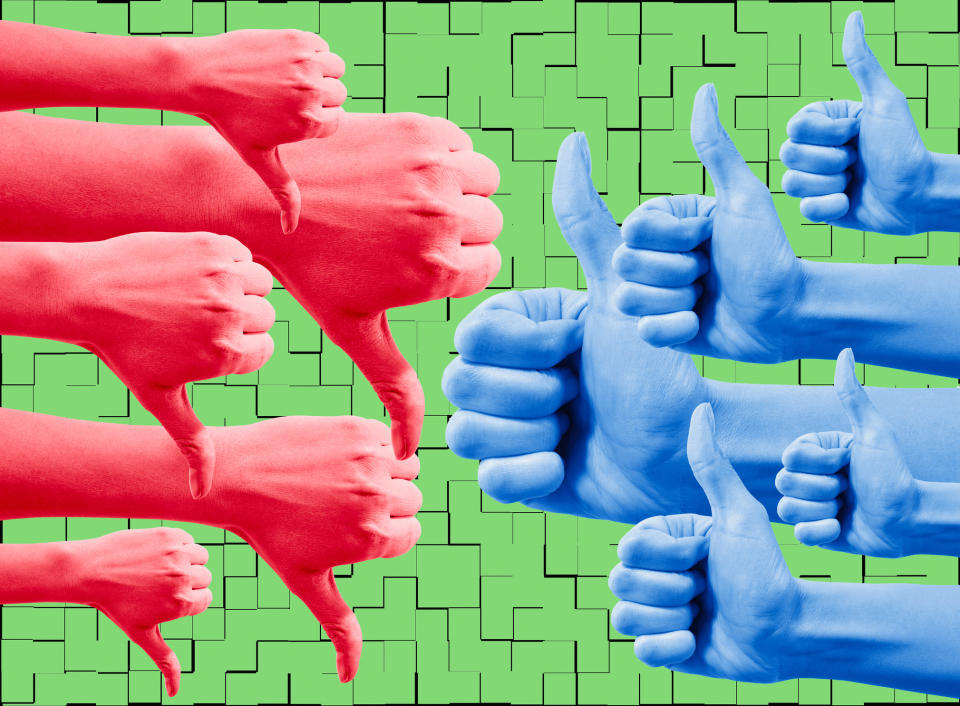If You Have A Friend With Differing Political Views, This Is For You

After memorizing the lyrics she’s penned about true love and heartbreak, it’s hard for Taylor Swift fans to admit that they perhaps aren’t privy to all of the pop icon’s innermost thoughts. While she’s been public for the past year about her romance with Kansas City Chiefs tight end Travis Kelce, Swift has been reticent thus far to reveal which candidate she’ll be supporting in November’s presidential election.
Some Swifties have been disappointed and frustrated by Swift’s lack of transparency on this issue, particularly because she went public in 2020 with her support of Joe Biden’s candidacy. More recently, fans are questioning Swift’s political allegiances after she was spotted at the US Open with Brittany Mahomes, whose online support of Trump has garnered thanks from the candidate himself. (Mahomes is married to Kelce’s teammate and best friend, Patrick Mahomes.)
What does Swift’s (literal) embrace of Mahomes mean? Which candidate is she backing, and, if it isn’t Trump, why is she still hanging out with a member of the opposing team?
We may never know the details of Swift’s politics, or her friendships. But this election season, many Americans do find themselves wondering if they will be able to maintain a friendship in spite of competing political views.
Luckily, most of us will have the opportunity to untangle this knot in private, away from public speculation — but that doesn’t preclude hurt feelings.

One option is to ignore the elephant (or donkey?) in the room, avoiding any mention of politics while you are together. This tactic works particularly well if your relationship is limited to a specific context. For example, when I learned that the parents of one of my son’s friends had voted for a particular candidate, I was careful to limit our conversations to topics that pertained to our children. If asked what I knew about their politics, I could say, somewhat honestly, that the subject never arose.
However, some people are able to maintain close, long-term relationships in spite of ideological differences. Voter Paul Calmes told HuffPost: “My wife has voted for Trump twice but isn’t sure if she’s going to vote at all this November. I voted for Clinton, Biden and will vote for Harris. It’s simply detente in our home.”
When it comes to his former coworkers, however, Calmes, a law enforcement officer for 30 years, has let friendships fizzle out.
Among his colleagues, he said, “I am in the minority of anti-Trump people. I don’t understand how any law enforcement officer could back this guy, and it makes me think less of them. Although being retired takes me out of the daily contact, I haven’t made much effort to see any of them.”
In other cases, friendships end with more of a bang.
Jane, a retired veterinarian, described how increasingly virulent political rhetoric eventually destroyed a friendship of several decades with a former client. At first, she was able to set aside her friend’s commentary: “She used to rant about Obama and I would ignore her, because she was spewing lies. Much like I did when she was hoarding food because the world was going to collapse in 2000.”
The Trump era, Jane believes, ushered in an era of unprecedented incivility, to which her friendship fell victim. “With Trump ... she started conversations that were truly bigoted.” The two haven’t spoken in over a year. “She’s in her 70s,” Jane told HuffPost. “It makes me sad.”
Johanna A. Solomon, an assistant professor at the Kent State University School of Peace & Conflict Studies, told HuffPost that it’s appropriate to enforce boundaries “if you find that a friend is not listening to you, has core values that devalue you or those you love, or is attacking you based on your identities.”
Solomon defines boundaries as “lines you set for yourself that are followed by actions you take to hold those lines,” and explained that they can range from agreeing not to speak about politics, not speaking with someone during the election season, or choosing not to be in your friend’s life anymore.
In some cases, it is possible to maintain the friendship and an open dialogue — it just requires effort and grace from both parties.
“As long as our conversations remain civil and objective, my friends and I navigate our differences without issue,” Mitch Brannen of Maryland told HuffPost.
“I believe that robust debate is essential for a healthy democracy. An echo chamber stifles the opportunity for meaningful discussion,” Brannen said, adding that he makes no effort to hide his intentions. “My friends are fully aware that I stand with the vice president.”
If dialogue is your goal, Solomon suggests that you begin by identifying the beliefs you do hold in common.
“If someone is your friend (or family member), there is a good chance you have important values in common as well as a history of resolving differences you have with each other,” she said.

As simple as it sounds, listening intently to another person’s perspective can make a meaningful back-and-forth possible. “Lead with active listening basics like curiosity and open-ended questions,” Solomon advised. You might start by asking “what values are most important to them,” she said, and making a good-faith effort to listen to their response.
“Usually, once someone feels heard, they are more open-minded in listening to others. You can share your own values and experiences as well. Speaking for yourself and from your own experiences is generally more powerful than speaking about or for others,” she continued.
If you find yourself disagreeing over basic facts, it may be helpful to consult nonpartisan or fact-checking websites together, Solomon said. She added that considering local issues can sometimes help people on opposing political parties to find common ground.
“You might find that you are not as far apart in values as the political divides in the U.S. encourage you to believe,” she added.
At the same time, it’s important to take care of yourself during this emotionally charged election cycle. “Don’t hesitate to talk to other friends, journal, seek therapy, or take a break from social media for a while,” Solomon said.
Engaging in advocacy for a cause you care about — whether it’s national or local politics, or something less partisan such as animal welfare — can go a long way in restoring your hope.
“Volunteer and invite your friends to do the same with you, so you can feel involved and have a little bit more control in what happens in your community,” Solomon said. This article originally appeared on HuffPost.

 Yahoo Lifestyle
Yahoo Lifestyle 
